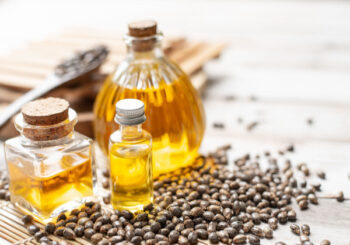Contributing writer for Wake Up World
Castor oil is considered one of the world’s oldest drugs, perhaps most well-known for its laxative effects and ability to induce labor in pregnant women1 — although I don’t recommend using it for the latter purpose.
Made by pressing the seeds of the castor bean plant (Ricinus communis), the resulting pale yellow oil is made up of 90% ricinoleic acid, along with small amounts of linoleic (4%), oleic (3%), stearic and linolenic fatty acids.2
[pro_ad_display_adzone id=”110028″]
Castor is native to India but cultivated in Mediterranean countries such as Algeria, Egypt and Greece. In France, castor is grown as an ornamental plant because of its large and lovely foliage.3 Many ancient civilizations, including early Egyptians, Chinese and Persians, valued the castor plant for its many uses, such as fuel for lamps and as an ingredient in balms and ointments.
In Prehistoric Times, Castor May Have Been Used as a Poison
While castor beans have notable anti-inflammatory, anthelmintic, antibacterial, wound-healing and laxative properties, they also contain ricin, a poison. This is why, if chewed and swallowed, castor beans are toxic. While ricin is also contained in the bean pulp that remains after it’s pressed for oil, it isn’t found in castor oil.
“Castor oil does not contain ricin because ricin does not partition into the oil,” according to the International Journal of Toxicology.4 It may be the poison from castor beans that has the longest usage. According to the Toxins review:5
“The castor plant has been known since time immemorial and its use in the prehistoric era has been evidenced by archaeological findings such as that of the Border Cave in South Africa. Traces of wax containing ricinoleic and ricinelaidic acids were found on a thin wooden stick, which was suggested to be a poison applicator, dating back to about 24,000 years ago.”
Ricin prevents protein synthesis and kills your cells through oral, nasal or intravenous transfusion. It’s so potent that ingesting or inhaling just 1 milligram may be fatal,6 just as eating four to eight castor seeds can lead to death.7 There is no antidote for ricin, which is why it’s even used as a chemical warfare agent. In 2013, there were reports of ricin being mailed to U.S. senators and even former President Obama.8
Castor Oil Used ‘Since Time Immemorial’
Castor bean has a number of beneficial properties that have been harnessed since ancient times. “The castor plant (Ricinus communis L.) has been known since time immemorial in traditional medicine in the pharmacopeia of Mediterranean and eastern ancient cultures. Moreover, it is still used in folk medicine worldwide,” University of Bologna, Italy, researchers wrote in the journal Toxins.9
In ancient Egypt, castor seeds and other parts of the plant were used for pharmacological purposes, including as a laxative, abortifacient and a treatment for baldness. Many other references also point to the importance of castor oil for medicinal purposes throughout history:10
- The Hearst Papyrus describes castor plant for expelling fluid accumulation and use in poultices for bandaging
- Ancient Egyptians used the castor plant for urinary disease in a possibly diabetic child
- Hippocrates prescribed castor oil as a laxative and detoxifying agent
- The Greek herbalist and physician Pedanius Dioscorides wrote about castor seeds’ expectorant, diuretic, emetic, laxative and anti-inflammatory properties to treat burns, varicose veins and bacterial skin infection
- Pliny the Elder described castor bean in “Naturalis Historia” (Natural History), which is considered the first encyclopedia
Further, traditional Chinese medicine recommends castor seeds for parasites, ulcers and chronic wounds, while in Ayurveda, castor is considered useful for rheumatic conditions, constipation, inflammation, fever, bronchitis, cough, skin diseases and colic.11
10 Modern-Day Uses for Castor Oil
While it’s long been known that castor oil acts as a laxative and labor inducer, it was relatively recently — in 2012 — when researchers found the mechanism behind it. It turns out that ricinoleic acid in castor oil connects to a prostaglandin receptor known as EP3.
“Thus, the castor oil metabolite ricinoleic acid activates intestinal and uterine smooth-muscle cells via EP3 prostanoid receptors,” according to the PNAS study.12 Ricinoleic acid also binds to EP3 in the uterus, which causes contractions.13
I don’t advise using castor oil as a labor stimulant due to its potentially harmful side effects. However, there are many reasons to keep a high-quality bottle of castor oil in your medicine cabinet, including the following.
1.Natural laxative — Castor oil packs, which are castor oil-soaked pads applied to the skin, may help relieve symptoms of constipation in the elderly.14 The U.S. Food and Drug Administration also describes castor oil as “generally regarded as safe and effective” for use as a stimulant laxative.15
Oral ingestion of castor oil can “purge” the digestive tract within two to five hours. However, remember to take it in the appropriate dose. Adults can take 1 to 2 tablespoons, while children 2 to 12 years old should be given only 1 to 2 teaspoons. Infants under 2 years old are not advised to take more than a teaspoon at a time. When giving it to children, try mixing it in freshly squeezed juice so it becomes more palatable.
2.Muscle pain relief — Topical application of ricinoleic acid found in castor oil may exert “remarkable analgesic and anti-inflammatory effects.”16 Rub castor oil on your muscles after an intense workout to promote blood circulation and relieve soreness. Mix it with peppermint oil or Roman chamomile oil for extra healing and soothing effect.
3.Alleviate joint pain — Ricinoleic acid in castor oil has a decongestant effect on the lymphatic system, which is responsible for collecting waste from your tissues and carrying it to your bloodstream for elimination.
If the lymphatic system is not working properly, such as in people with arthritis, joint pain occurs. Massaging castor oil on the joints can help ease the congestion and jumpstart your lymphatic system. Research published in Phytotherapy Research supports this, revealing that castor oil helps relieve pain and “can be used as an effective therapy” among patients with knee osteoarthritis.17
4.Remedy for fungal diseases — Castor oil may be useful for reliving common infections like ringworm, jock itch (tinea cruris) and athlete’s foot. Research also suggests that phytochemical compounds in castor essential oil may relieve infections caused by Cunninghamella bertholletiae fungi as well as standard antifungal drugs.18
Simply warm the oil, apply onto the affected area before bedtime and leave it on overnight. Repeat for a week or until the infection has disappeared completely. Due to its antimicrobial effects, a castor oil solution may also be useful for denture cleaning.19
5.Promote healthy hair growth — Massaging warm castor oil on your scalp (and even your eyebrows) may stimulate the follicles and result in extra hair growth. Do this every night, and you might see improvement in as little as two weeks. Castor oil may work on areas that have been affected by alopecia as well.
In addition to offering a moisturizing effect on hair, the fatty acids in castor oil may nourish the hair follicle. Ricinoleic acid also helps protect the scalp and hair shaft form fungal and microbial infections. It also penetrates the skin and may inhibit prostaglandin D2 synthase, which inhibits hair growth.
“Ricinoleic acid has a two-dimensional structure, which is very similar to the prostaglandin family and has also been demonstrated to have some degree of effect on hair growth,” according to research in the International Journal of Trichology.20 By locking in moisture, castor oil may also give your hair a richer and thicker appearance.
To get this effect, warm a tablespoon of the oil and use your fingertips to coat each strand, running your fingers through your locks to get it on as much hair as possible.
6.Natural mascara — Melt a tablespoon of beeswax in a double boiler, then add 2 tablespoons of charcoal or cocoa powder (depending on your hair color) and castor oil. Mix until you get the desired consistency. This homemade mascara contains no toxic chemical ingredients, unlike other conventional beauty products out there. Alternately, you can apply castor oil to your lashes every night to make them look fuller and thicker.
7.Moisturize skin and support skin health — The fatty acids in castor oil help nourish and moisturize dry skin. Due to its viscous nature, it stays put and easily penetrates your skin tissue. Castor oil is considered an occlusive moisturizer, which forms a barrier on the skin, helping to prevent the evaporation of water.
“This barrier allows replenishment of the water content of the stratum corneum by the deeper layers of the epidermis and dermis,” according to the National Library of Medicine’s StatPearls.21 Remember that a little goes a long way — simply rub a teaspoonful between your palms and apply all over your skin. You can also mix castor oil with a carrier oil to reduce any risk of irritation.
Because of castor oil’s antimicrobial and anti-inflammatory properties, it may also have some beneficial effects on skin tags, acne and warts. One study published in the Journal of International Toxicology also found that castor oil may have positive effects against occupational dermatitis.22
It also has strong antibacterial properties, including against Staphylococcus aureus,23 which can cause skin infections. An ointment made of balsam Peru, castor oil and trypsin also helped to heal pressure ulcers faster among residents in a long-term care facility.24 If you see minor cuts or wounds on your dog’s or cat’s skin, dabbing a bit of castor oil on them may also help facilitate healing, again due to its antimicrobial and anti-inflammatory effects.
If your pet licks the wound (as most pets do), the oil is not harmful but could lead to loose stools.
[pro_ad_display_adzone id=”110030″]
8.Promote restful sleep and relieve colic — Although research in this area is scarce, anecdotal reports suggest that dabbing a small amount of castor oil on your eyelids or using a castor oil pack can help you fall asleep easier. Castor oil may also promote a deeper and longer sleep.
Among infants, castor oil is also sometimes used for colic, which can lead to long periods of excessive crying. Its exact cause is still unknown, although gas is believed to be a major culprit. To use castor oil for colic, simply rub it gently on your child’s abdomen.
9.Relief from dry eye and other eye surface diseases — Castor oil, with its antimicrobial, anti-inflammatory, pain-relieving, antioxidant and wound-healing properties, may be useful when applied topically to the eyes, helping to increase tear film lipid layer thickness and relieve symptoms of ocular surface diseases. Writing in Clinical and Experimental Optometry, researchers explained:25
“Evidence of beneficial effects on the lipid layer, tear film integrity, eyelash health and meibomian gland functionality, suggests that topical application of pure castor oil to the periocular skin may offer a safe, natural, affordable and effective management option for common abnormalities of the tear film and ocular surface, indicating that a more extensive and thorough exploration of this topic is warranted.”
10.All-around lubricant — If you have items around your home that need lubrication, such as squeaky hinges, scissors or meat grinders, castor oil works perfectly for these problems. Due to its consistent viscosity, castor oil does not freeze, so it can be used in conditions with hot or very cold temperatures.
Castor Oil Risks to Watch Out For
Pregnant women shouldn’t use castor oil due to its ability to induce contractions. Even late in pregnancy, I don’t recommend using castor oil to stimulate labor. One study reported that all pregnant women who took castor oil experienced nausea afterward.26
Another study also warned that the castor oil-induced contractions may lead to the passage of meconium — a baby’s first stool — while still inside the womb, putting them at risk of meconium aspiration that may result in neonatal respiratory distress.27
Further, as with any herbal oil, I recommend that you use castor oil with care, as it can have potentially negative side effects. Those with sensitive skin may experience allergic reactions when using this oil topically, which is why I advise doing a skin patch test prior to applying it copiously on large skin areas.
If taken internally, castor oil may also lead to gastrointestinal upset and discomfort, as well as dizziness and nausea. So if you suffer from any digestive problems like irritable bowel syndrome, ulcers, cramps, diverticulitis, colitis or hemorrhoids, I advise you to avoid using this oil. Those who have recently undergone surgery should also refrain from using castor oil.
Lastly, make sure that you purchase organic castor oil from a reputable source. Commercial castor oil sold in stores today often comes from castor seeds that were likely heavily sprayed with pesticides or processed with solvents and other chemical pollutants, which damage its beneficial components and may even contaminate the oil.
Sources and References:
- 1, 12 PNAS May 21, 2012
- 2 Lipid Insights. 2016; 9: 1–12
- 3 Botanical.com, Castor Plant
- 4, 15, 22 Int J Toxicol. 2007:26 Suppl 3:31-77. doi: 10.1080/10915810701663150
- 5, 9 Toxins (Basel). 2019 Jun; 11(6): 324
- 6 Cornell University, Ricin Toxin from Castor Bean Plant, Ricinus communis
- 7 American Journal of Emergency Medicine, 1986 May;4(3):259-61
- 8 Popular Science, April 18, 2013
- 10, 11 Toxins (Basel). 2019 Jun; 11(6): 324, Castor Bean in Traditional and Folk Medicine
- 13 Science May 21, 2012
- 14 Complement Ther Clin Pract. 2011 Feb;17(1):58-62. doi: 10.1016/j.ctcp.2010.04.004. Epub 2010 May 18
- 16 Mediators Inflamm. 2000; 9(5): 223–228
- 17 Phytother Res. 2009 Oct;23(10):1469-73. doi: 10.1002/ptr.2804
- 18 Journal of New Developments in Chemistry 3(1):1-11. doi: 10.14302/issn.2377-2549.jndc-20-3484, Conclusion
- 19 Braz Oral Res. 2015:29:1-6. doi: 10.1590/1807-3107BOR-2015.vol29.0104. Epub 2015 Aug 21
- 20 Int J Trichology. 2022 May-Jun; 14(3): 84–90., Castor Oil
- 21 National Library of Medicine, StatPearls, Moisturizers, Types of Moisturizers
- 23 BMC Complement Altern Med. 2016; 16: 211
- 24 J Wound Ostomy Continence Nurs. 2005 May-Jun;32(3):163-70. doi: 10.1097/00152192-200505000-00004
- 25 Clinical and Experimental Optometry October 9, 2020
- 26 The Cochrane Database of Systematic Reviews, 2001;(2):CD003099
- 27 Journal of Biology, Agriculture and Healthcare, 2014 4:(4)
About the author:
Born and raised in the inner city of Chicago, IL, Dr. Joseph Mercola is an osteopathic physician trained in both traditional and natural medicine. Board-certified in family medicine, Dr. Mercola served as the chairman of the family medicine department at St. Alexius Medical Center for five years, and in 2012 was granted fellowship status by the American College of Nutrition (ACN).
While in practice in the late 80s, Dr. Mercola realized the drugs he was prescribing to chronically ill patients were not working. By the early 90s, he began exploring the world of natural medicine, and soon changed the way he practiced medicine.
In 1997 Dr. Mercola founded Mercola.com, which is now routinely among the top 10 health sites on the internet. His passion is to transform the traditional medical paradigm in the United States. “The existing medical establishment is responsible for killing and permanently injuring millions of Americans… You want practical health solutions without the hype, and that’s what I offer.”
Visit Mercola.com for more information, or read Dr. Mercola’s full bio and resumé here.
[pro_ad_display_adzone id=”110027″]








